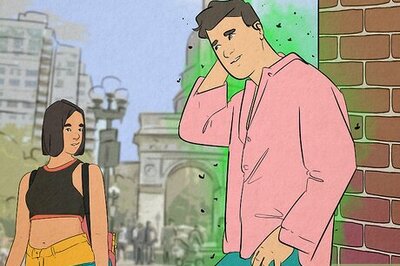
views
As Covid-19 case counts are rising again, there are apprehensions of a fresh wave building up. Surveillance systems are being strengthened, both through a 2 percent testing of incoming international travellers and increased community level testing. Healthcare systems are being put on alert, even though the risk of severe illness from the currently circulating Omicron sub-variants appears to be low. Life is still in uninterrupted motion, despite the concerns. However, there is one aspect of social life which has been vulnerable to disruption in the past and needs protection even as we gear up our defences. That is school education.
Schooling has resumed with caution after several months of closure. There were many expressed concerns and counterposed claims on potential harms of opening of schools or continuing to shut them. Though the decision to reopen schools has come rather late, it is a much needed measure to ensure that young children are not deprived of the scholastic and socialisation benefits of in-person schooling.
Two concerns were voiced about reopening schools, even when other elements of social life (work, business, travel, sports and entertainment) opened up after both the first and second waves of Covid-19 in India. The first was that since children move and socialise a lot, they can become rapid spreaders of disease. The second was that children, who were not eligible for vaccination in 2021, may be severely affected by the virus. So, school closures were advocated to protect both the children and the adults they might infect. Both concerns have been shown to be misplaced.
Children are no more likely than adults to be infected by the SARS-CoV-2 virus. Transmission occurs through both droplets and aerosols. The risk of infection depends on the site, duration and intensity of exposure to the virus. An adult working in a crowded, closed building is more likely to be infected than a child in a class room with open windows or on the playground where the wind does not permit viral clouds to form or hang around. Masking, by children and school personnel, will reduce the risk of transmission even when a fresh wave is building up.
It is by now clearly evident that children are less likely to suffer from severe illness, even when infected by the SARS-CoV-2 virus. This may be because the numbers of ACE-2 receptors, the portal of entry of the virus into human cells, are lower in number in a child than in an adult. Since the intensity and duration of illness is shorter in a child than in an adult, the risk of transmission to others in the community is also correspondingly lower. While a small proportion of children have been reported to suffer from Multi-System Inflammatory Syndrome of Children (MIS-C), the overall numbers are very few. Children who are immunocompromised or have risk enhancing comorbid health conditions must be protected from exposure and provided vaccines which are presently permitted.
The virus will stay on, as a part of our ecosystem. It may not yet have reached the state of steady endemicity, where the behaviour is predictable and permits planned responses. However, the perpetuation of the Omicron sub-lineages globally suggests that the virus is establishing itself as a very infectious, highly immune evasive but relatively low virulent descendant of the ancestral virus. While the virulence may be partly blunted by acquired immunity from prior infections or vaccines, the reduced propensity for penetration into the lungs or blood vessels suggests that the virus is following the evolutionary biology pathway to continued co-existence with humans. The biologically sustainable course for the virus from now on is to infect many but kill only a few. While the risk of a dangerously virulent new mutant emerging from immunocompromised persons or infected animals does exist, it is a low probability event.
There will be periodic outbreaks, as immunity wanes among susceptible persons, Covid-appropriate behaviour is abandoned or new variants emerge with higher infectivity. We need not be perpetually prisoners of masks but must wear them when there is increased transmission in the community. Vaccines too are helpful, not in preventing infection but for protecting against severe illness. Three doses seem to be the advisable regimen, for the present. Substantial benefits of more doses against Omicron are yet to be demonstrated. Like in a mild drizzle, we use an umbrella, we must use masks as needed to protect against viral exposure, when cases are rising. When there is a threat of more severe illness, vaccines will help like raincoats protect against being drenched by a heavy shower. Life should not stop unless there is a flood.
Covid-19 also offers us an opportunity to extend school-based learning beyond the formal curriculum. There are many useful learnings for life which can form part of group learning in schools. How can we promote innate immunity against infections through nutritious diet, physical activity, adequate sleep and avoiding immunity sapping addictions like tobacco, alcohol and drugs? The harm caused by ultra-processed foods and sleep depriving digital device addiction is especially pertinent in this context. The increased risk from comorbid conditions like hypertension, heart or lung disease, obesity and cancers can be a prompt not only to discuss why some adult family members may be at greater risk but also to encourage the students themselves to adopt healthy living habits to reduce the risk of adult chronic diseases.
Older school students can be engaged in discussions on why social solidarity within countries, and global solidarity among nations, is an essential part of pandemic response. Why people must wear masks and avoid crowded celebrations, not only to protect self but also others, as part of good civic conduct. How vaccine nationalism and fierce protection of intellectual property rights for promoting commercial profit over global health needs, even during a pandemic, is both unethical and unwise.
A discussion that must be had in schools is on the ecologically irresponsible patterns of development that have created conveyor belts for zoonotic pandemics. How deforestation removes the natural barriers between forest dwelling viruses, veterinary populations and human habitat. How unsustainable production and consumption of animal meat provides an opportunity for viruses to multiply and mutate at rapid scale. By stirring such discussions in the Covid-era of schooling, we will provide an opportunity to young students to become better global citizens and shape a better future for humanity. Isn’t that the prime purpose of education?
Prof K Srinath Reddy, a cardiologist and epidemiologist, is president, Public Health Foundation of India (PHFI). The views expressed in this article are those of the author and do not represent the stand of this publication.
Read all the Latest News, Breaking News, watch Top Videos and Live TV here.


















Comments
0 comment